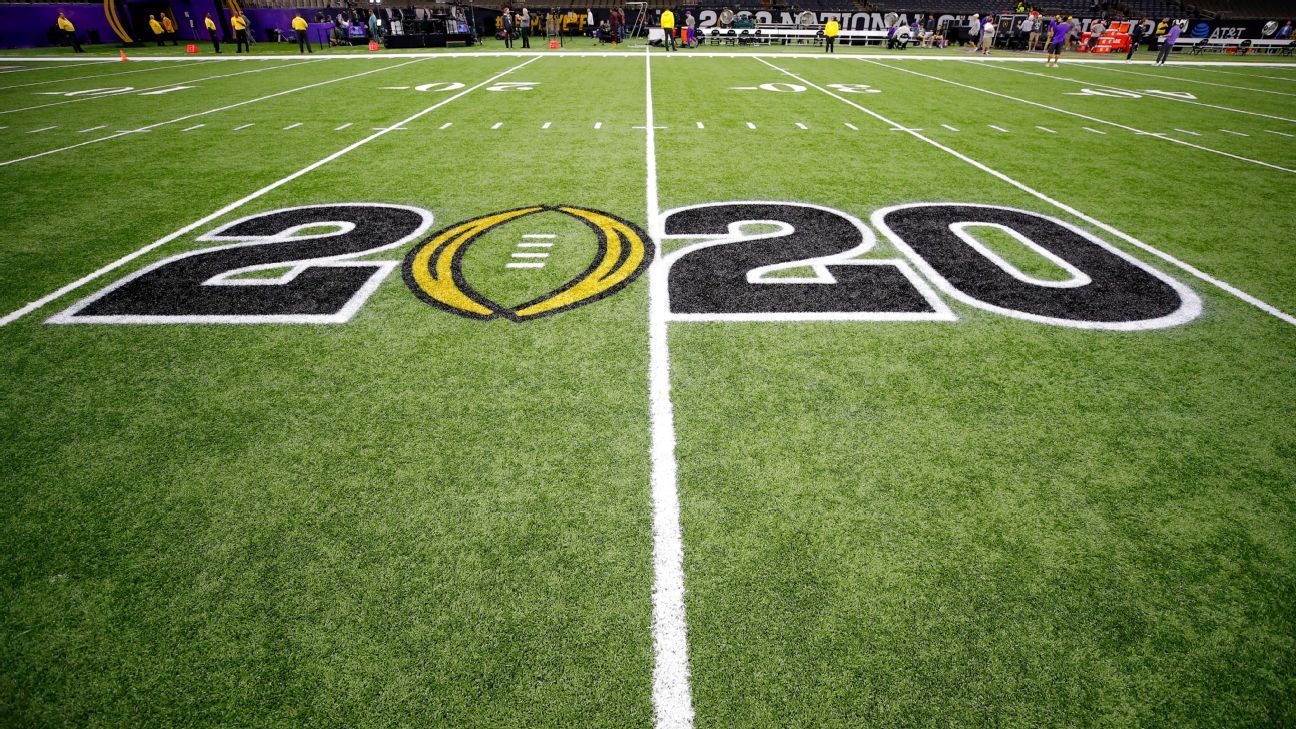Concern about the 2020 college football season had been mounting, even at the highest levels of the sport. But until last week, it had been expressed through foreboding words, not concrete actions.
On two mornings spaced four days apart, the questions of which FBS team and which FBS league would be first to opt out of fall football were answered. Wednesday began with Connecticut cancelling its season, a notable move yet easily rationalized, given the program’s independent status and free-falling on-field play.
Then, shortly after 10 a.m. ET Saturday, word leaked that Mid-American Conference presidents had voted to postpone the fall sports season, including football. An emotional commissioner Jon Steinbrecher soon confirmed what he called “a miserable decision,” and echoed many in saying, “If you told me in March we’d be here today, I’d never have believed it.”
There will be no #MACtion this fall, and sources around college football expect other leagues to follow. The postponement or cancelation of the season, they say, is inevitable. Some administrators and coaches point out that it ultimately will take a Power 5 conference to move things in that direction, but that day soon could be coming, especially with Pac-12 presidents and chancellors set to meet Tuesday.
“Nobody wanted to be the first to do it,” a Power 5 coach told ESPN, “and now nobody will want to be the last.”
A Power 5 administrator added: “It feels like no one wants to, but it’s reaching the point where someone is going to have to.”
Will there be a rush of league cancellations this week? Many around the sport are watching two conferences, the Big Ten and Pac-12, which often move in lockstep. On consecutive days last month, they became the first FBS leagues to announce conference-only schedule models for the 2020 season. The two sets of presidents are closely linked because many of the schools are members of the Association of American Universities and have similar academic missions, and league commissioners Kevin Warren (Big Ten) and Larry Scott (Pac-12) have followed every announcement about the season with the qualifier that it may never kick off.
“Pac-12 and Big Ten, they are in it together,” a Group of 5 athletic director said before the MAC’s announcement.
The Pac-12 is facing regional challenges to start football practices because of virus rates in Arizona and Southern California, as well as state restrictions. The league also is dealing with #WeAreUnited, a broad and organized player unity group demanding improvements around health and safety, racial justice initiatives, compensation and other areas. ESPN first reported Saturday that the Pac-12 players came away disappointed from their initial meeting with Scott and other league officials. A Pac-12 administrator said league presidents are getting “squirrely,” and several league sources said they wouldn’t be surprised if the presidents vote Tuesday to cancel fall sports.
Big Ten presidents met Saturday, and while they didn’t vote to postpone the fall sports season, the league announced that football practices would remain in the initial “acclimatization phase” until further notice because of information from the league’s COVID-19 medical advisory groups. Warren has spoken extensively in recent days with the league’s campus medical advisers and sports medicine groups.
Illinois coach Lovie Smith said his staff was informed of the league’s decision to continue in helmets only and without contact about an hour and a half before his team’s third practice on Saturday.
“We’re practicing football right now [and] we want to play,” Smith said. “I want to play. [The players] want to play. If they tell us we can’t play, when is the next time we can play? If that is the spring, so be it. Eventually we’re going to have football so we’re going to embrace that time whenever it comes.”
“Nobody wanted to be the first to do it, and now nobody will want to be the last.”
Power 5 head coach, on conferences canceling fall football
The potential long-term effects of COVID-19, even for athletes who have recovered, is on the radar for college football’s power brokers and factored into the MAC’s decision to postpone, Northern Illinois athletic director Sean Frazier told ESPN. This past week, Clemson coach Dabo Swinney revealed that defensive lineman Xavier Thomas has been medically shut down since March because of illnesses, including COVID-19. LSU defensive end Travez Moore and Arizona wide receiver Jaden Mitchell wrote on Twitter that they’d suffered significant weight loss after contracting COVID-19.
“My training staff and everyone at the University of Arizona has done a GREAT job of making us feel safe and taken care of,” Mitchell wrote. “Even though they did everything they could, being in a room or house for 28 days had a great impact on my body and mental health. The fact of the matter is that if this virus gets a hold of you and you experience symptoms, it will have a great impact on you.”
Sources said team physicians around the sport are noticing cases of myocarditis, an inflammation of the heart muscle caused by viral infection, in college athletes who have had COVID-19. College administrators last week saw the Facebook post from Debbie Rucker, mother of Indiana offensive lineman Brady Feeney, who wrote that her son was still dealing with potential heart problems.
“What we don’t know was really haunting us, and that’s why we came to our final decision,” Frazier said. “That’s part of the data that our presidents used. This mom gave us a play-by-play. That stuff is extremely scary.”
Steinbrecher, Frazier and others in the MAC stressed that health and safety, not concerns about finances, drove the league’s decision to postpone fall sports. But some think the resource gaps between leagues like the MAC and the Power 5 will give the big leagues a chance to play, especially if reliable rapid testing improves. “The Power 5 can afford the high costs of testing,” a Power 5 administrator said.
But can they afford the optics, especially if a Power 5 league decides not to play this fall?
“As much as the Big 12, SEC or anybody else wants to play and is making preparations to play, the presidents and chancellors aren’t going to want to be on an island by themselves,” a Power 5 athletic director said. “They will be the ones to shut it down, even if the league commissioners are determined to hold out. … Everybody’s going to be watching what the Pac-12 and Big Ten do over these next few days. That’s for sure.”
As for the MAC, some downplayed the significance of its postponement.
“The MAC’s decision doesn’t affect us at all,” an ACC athletic director said. “They have to do what they feel is best, and we’ll do the same.”
On Saturday, ACC schools like Clemson and Florida State continued their preseason camps; the Seminoles are scheduled to use pads for the first time on Sunday. Austin Peay, which is still planning to play along with the rest of the FCS Ohio Valley Conference, scrimmaged for the first time on Saturday.
“These guys love football,” FSU coach Mike Norvell said. “They want to play football. We’re not ultimately in control of those decisions.”
With the upcoming season apparently hanging in the balance, several players, including Clemson quarterback Trevor Lawrence, Penn State tight end Pat Freiermuth and others, were outspoken on Twitter about their desires to play this upcoming season.
Since day one coming back to campus the Penn State Football staff and medical experts have put our health and safety first, above anything else. The guidelines put into place keep us safe while playing the game we love. We are ready to play and we want to play.
— Pat Freiermuth (@pat_fry5) August 9, 2020
I don’t know about y’all, but we want to play.
— Trevor Lawrence (@Trevorlawrencee) August 8, 2020
Decisions made over the next several days might determine whether they get their wish. Several Sun Belt sources told ESPN that the league remains committed to playing this fall and cares more about what happens in the SEC as opposed to other conferences.
One SEC athletic director told ESPN that the feeling within the SEC was to stay the course and see where things stand at the end of September, when the league is scheduled to start playing games.
“If our position last week was, ‘Let’s see what happens when all of the students return to campus, there’s no new data that causes another decision right now … besides fear,” the athletic director said.
Others said the MAC’s decision simply speeds up the process to wipe out fall football.
“They’re pulling the plug sooner rather than later,” a Power 5 athletic director said. “Just get it over with and let us figure out how to survive.”
The MAC hopes to play football in the spring, as do several FCS leagues that called off fall seasons last week. The spring option is gaining more traction throughout the sport, but many remain skeptical, noting that the virus conditions might not change and players would face additional physical demands with trying to play two seasons in one calendar year.
“You’re going to have to look at the number of games you play in both seasons and probably shorten both seasons, so what you’re doing is impacting both 2020 and 2021,” a Power 5 coach said. “That may be the only option, but it’s not a good one, especially for the players.”
ESPN reporters Chris Low, David Hale and Sam Khan Jr. contributed to this story.


